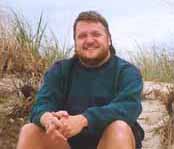| Going
techno - what would Henry think? |
As I sit here at
my computer pounding through HTML, JPG and text files, I can't help
but feel that I'm a bit of a hypocrite.
The Outermost Web Site is in its 10th month of existence, showcasing
Henry Beston's literary classic "The Outermost House" and
trying to establish an understanding of the spirit of life on the Great
Outer Beach of Cape Cod. Basically, we're reaching into the natural
world, and here I am, utilizing many of the very technological advances
that blantantly contradict that entire thought process.
|
All of this
has me wondering what good old Henry himself would have thought
if he had access to AOL, Pentium chips, e-mail and all the other
goodies of the new electronic age.
Beston did
much of his writing in an era that followed the Industrial Revolution
in this country, and even the new toys of the first half of the
20th century often sent him running for cover.
|
 Don
by the Sea
Don
by the Sea
By Don Wilding |
|
Beston disliked
many of the new conveniences of his time -- that was one one of the
reasons he and his wife, Elizabeth Coatsworth, purchased Chimney Farm
in Nobleboro, Maine in the early 1930s -- because he wasn't fond of
the increased automobile traffic and clutter in the Boston suburb of
Hingham, Mass., where the Bestons made their home after they married
in 1929. Beston's writing often focused on how machinery and its like
were taking over society, leaving the natural world behind.
Beston, a burned-out magazine editor, left New York and all its glitz
behind in the early 1920s before deciding to spend that eventful year
in Eastham on Cape Cod. He saw the direction society was heading back
in the 1940s -- in the pages of "Northern Farm," he writes
of how "the chromium millennium ahead of us, I gather, is going
to be an age whose ideal is a fantastically unnatural human passivity."
Machines will do everything for man, Beston continues, and he finds
that "appalling." Yet, on the same token, he is open to the
thought of a modern convenience or two.
"No, I do not mean that we should take the hardest way," he
continues. "Compromises are natural and right. But a human being
protected from all normal and natural hardship simply is not alive."
Man, never a creature to have complete control of his senses, is becoming
more and more dependent on technology. Someday soon, I'm told, we may
have cars that do the driving for us. Banking is done more and more
online, a thought that terrifies me. News programs, which cram information
down our throats through all kinds of media outlets, tell us frequently
that robots are now capable of doing household chores for us (at a lofty
price).
Somehow, I doubt that this is what God had in mind for us all.
"Machinery is all right as a servant, but it is poison as a master,"
Beston told a Quincy, Mass. American Legion gathering in 1933.
Technology is taking over. Modern society needs to find a way to control
it before it completely consumes us.
"What we must ask today is whether or not the mechanist strain
has increased out of all bounds, and taken over an undue proportion
of the way of life," Beston wrote in "Northern Farm."
"It is well to use the wheel but it is fatal to be bound to it."
Now that this page is written, formatted and loaded, it's time to put
the wheel aside. The dog is bugging me to take her for a walk. I think
getting out of the apartment and taking an hour-long stroll through
the woods will do us both an awful lot of good.
Filed May 21, 2000
Don
by the Sea archives

|